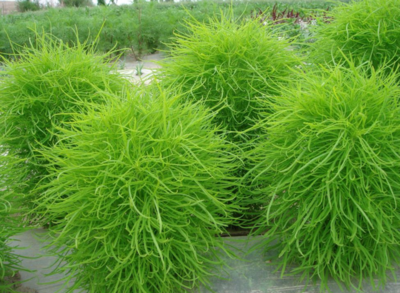Chinese Herbal Remedies for Cystitis: Can Kochia Scoparia Cure the Disease?
Many Chinese herbs have high medical value and are being more and more widely used in clinical Chinese medicine. Today, we will introduce to you an herb that also has medical value: Kochia Scoparia, a traditional Chinese medicine.

It is commonly known as "broom grass" because it can be made into a broom for sweeping the floor after it dries up. Kochia Scoparia has the effect of clearing away heat, detoxifying the body, and inducing diuresis for treating stranguria.
So, can Kochia Scoparia treat cystitis?
Kochia grass is bitter and tastes cold. It belongs to the liver, spleen, and large intestine meridians, with the effect of clearing away heat, detoxifying the body, and inducing diuresis for treating stranguria. The specific analysis is as follows:
Clearing Away Heat and Detoxifying the Body: The Kochia plant is bitter and cold and can clear liver heat and remove toxins. So, it can be used to treat swollen and painful eyes night blindness, and can relieve diarrhea.
Inducing Diuresis for Treating Stranguria: Kochia scoparia has the effect of inducing diuresis, so it can be used to treat symptoms of pain in the urethra during urination.
It is because of the effects mentioned above that the correct use of Kochia grass can relieve the symptoms of frequent urination and painful urination in cystitis patients. However, this herb is not a commonly used Chinese medicine in clinical practice and should be used appropriately according to the doctor's advice to minimize the occurrence of adverse reactions.
In addition, this herb contains oxalic acid, which should not be used in excess or for an extended period to avoid causing stone disease. For people with allergies, it should also be used with caution.
So, how can people with cystitis consume Kochia grass? There are three main ways:
1. Cold and Dressed with Sauce
Wash the young tips of broom grass, put them into a pot of boiling water, and cook for 10 minutes until soft and cooked, then take them out and dry. Then, pour in an appropriate amount of refined salt, soy sauce, cold vinegar, peanut foam, garlic, and a little sesame oil, mix well, and serve.
2. Steamed in Clear Soup
Wash the young tips of the grass, and take out the water control into a larger pot. Sprinkle the appropriate amount of flour, and grasp the companion evenly so the flour is wrapped in the grass. Place the flour-coated broom straw on a steamer cloth and steam until done. Add the garlic and vinegar to the steamed Kochia, stir well, and serve.
3. As Dumpling Filling
Wash the young tips of Kochia grass, put them into a pot of boiling water, take them out, cut them into chopped vegetables, add meat, salt, soy sauce, sesame oil, and other seasonings, and mix them well to make the dumpling filling. Make dumplings with the grass filling and cook the dumplings.
Above is the introduction of this herb and its specific efficacy in treating cystitis, how to consume it, etc. It should be noted that the use of broom grass to treat cystitis has limited efficacy to cure the disease. It also relies on formal drug treatment.
Traditional Chinese medicine, such as Diuretic and Anti-inflammatory Pill, is mainly for nonbacterial cystitis treatment. By clearing away heat, detoxifying the body, and inducing diuresis for treating stranguria effect, it can effectively improve urinary discomfort, relieve pain in the bladder area, and eliminate the inflammation to achieve the purpose of the root cause of the disease. Western medicines, on the other hand, are mainly for treating bacterial cystitis, and commonly used Western medicines include cefdinir capsules, levofloxacin, or minocycline hydrochloride.
For patients with obvious symptoms of bladder irritation, antispasmodic drugs can be given to relieve symptoms and do special treatment; for example, sodium bicarbonate or potassium citrate and other alkaline drugs can reduce the acidity of the urine to relieve bladder spasms. In addition, Tolterodine can also relieve bladder spasms and reduce the symptoms of urinary tract irritation.
In addition, patients in the process of taking medication should avoid eating spicy and stimulating food, and not smoke and drink alcohol. They can drink more water and urinate regularly, which is conducive to the early recovery of cystitis symptoms. After the disease is cured, patients should also pay attention to regulating daily life, not staying up late, and not sitting for a long time, which are effective measures to prevent the recurrence of this disease.
You may also be interested in:
How Effective is Moxibustion in Treating Chronic Cystitis?
What Exercises are Beneficial for Treating Cystitis?
Cystitis Still Not Improving After Taking Medication? What Should I Do?



